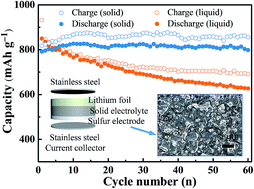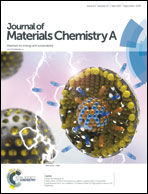All-solid-state lithium–sulfur batteries based on a newly designed Li7P2.9Mn0.1S10.7I0.3 superionic conductor
Abstract
Conventional liquid lithium–sulfur batteries (LSBs) suffer from safety issues and poor cycling performance. The effective solution is to replace the liquid electrolyte with a solid one with high ionic conductivity and excellent electrochemical stability. Herein we report a lithium superionic conductor of Li7P2.9Mn0.1S10.7I0.3 as a solid electrolyte via high-energy milling. The Li7P2.9Mn0.1S10.7I0.3 glass-ceramic possessed a high ionic conductivity of 5.6 mS cm−1 at room temperature and a wide voltage stability up to 5 V vs. Li/Li+. Sulfur-based composites were prepared by mixing sulfur powder, carbon black and the solid electrolyte and utilized as the cathode for all-solid-state LSBs. Noticeably, the sulfur composite cathode showed a large capacity of 796 mA h g−1 at 0.05C and much better cycling stability than the counterpart with organic liquid electrolyte. Our newly designed solid electrolyte shows promising industrial prospects for application in all-solid-state LSBs.



 Please wait while we load your content...
Please wait while we load your content...